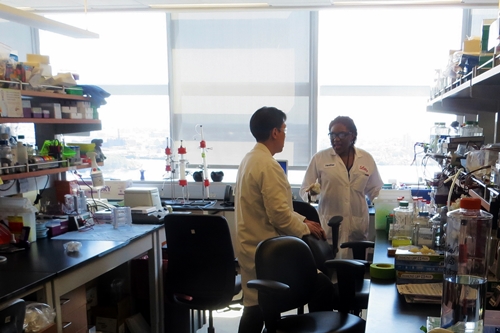
Molecular biology lab at Eli Lilly and Co. in New York (A. Kotok)
11 December 2015. An analysis of recent grant-funded Ph.D. recipients shows a large number of new doctorates taking jobs in industry, particularly with larger companies paying higher salaries. The study of federal and other grant-supported doctorates, conducted by researchers at several universities and policy institutes, appears in today’s issue of the journal Science (paid subscription required).
The study aimed to show how public investment in research pays off in the larger economy. One direct and measurable indicator of that impact, say the researchers, is the employment track taken by students whose doctoral research is funded by grants from the federal government and others. Yet, little systematic data are available so far on the course taken by new doctorates, particularly those entering the private sector.
The research team led by urban studies professor Julia Lane at New York University, economist Bruce Weinberg at Ohio State University, and sociologist Jason Owen-Smith at University of Michigan drew their data from the Umetrics project, an initiative begun by the Committee on Institutional Cooperation assessing the economic impact of research universities on economic activity. Umetrics is now managed by Institute for Research on Innovation and Science or Iris at University of Michigan
Committee on Institutional Cooperation is a consortium of largely Midwestern research universities belonging to the Big Ten athletic conference, plus University of Chicago. This study followed nearly 3,200 Ph.D. students whose research was supported by federal grants at 8 of these institutions — Universities of Indiana, Iowa, Michigan, Minnesota, Wisconsin, Ohio State, Penn State, and Purdue — from 2009 to 2011. Umetrics provided university administrative data, which were matched to U.S. Bureau of the Census data on employment and earnings for 2010 to 2012.
The results show a majority of new Ph.D.s still take postdoctoral positions in the academic community or in government labs, but nearly 4 in 10 of the new doctorates (38%) take industry jobs. Ph.D. recipients taking industry jobs are more often rewarded with higher salaries, particularly those who begin work at larger and faster-growth companies. Those with degrees in mathematics, computer science, and engineering generally earn the highest annual salaries, averaging $65,000 or more. Biology and other life science degree recipients fare less well, averaging about $36,000 per year, which the authors surmise may result from lower-paid competing postdoctoral positions.
The vast majority new Ph.D.s (78%) leave the state where they receive their degrees, with nearly 2 in 10 (19%) heading to California. But of the 22 percent staying in-state, most (13%) remain within 50 miles of the university campus. In addition to California, home to many R&D jobs, other favorite destinations of new Ph.D.s are Illinois, New York, Texas, North Carolina, Massachusetts, Pennsylvania, and Washington state, also with many R&D jobs.
While new doctorates going to industry overall favor larger companies with higher payrolls, to many new degree recipients the age of the company makes a difference. Recipients of Ph.D.s in engineering, mathematics, computer science, and physics are more likely to take jobs at younger companies, those in business for 5 years or less. Many of these younger companies are in high-tech and professional service industries.
Read more:
- Univ. Research Execs See Science Economic Benefits
- Report Evaluates Industry-Academic Biotech Partner Roles
- Report: Affordable Care Act Remaking U.S. Health Sector
- Making Bootstraps: A Mid-Career Break to Boost Wage Growth
- Report: U.S. Edge in Advanced Industries Slipping
* * *

 RSS - Posts
RSS - Posts
You must be logged in to post a comment.